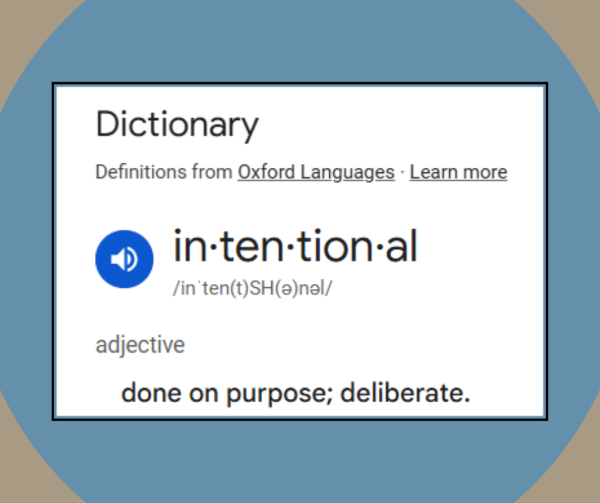What Does Being Intentional Really Mean—And Why It Matters for Your Relationships and Life
Being intentional isn’t just a nice idea—it’s a game-changer
Each of us runs a large part of life on autopilot. To be sure, our lives require the ‘autopilot’ functions of breathing, digestion, sweating, et cetera. But that’s not what I’m talking about here—I’m talking about when we react instead of respond, cruise instead of choose
That’s where being intentional comes in. It’s the difference between hoping things improve and making sure they do.
Being intentional means acting on purpose. It's doing things consciously, rather than by default, habit, or ‘automation’. Whether you're working on yourself, your relationship, or moving through a life transition, being intentional puts you back in the driver’s seat.
So, what does being intentional really mean?
What does being intentional mean?
Being intentional is about awareness and choice. It’s taking a moment to ask yourself, What am I doing? Why am I doing it? And does this move me toward who I want to be or the kind of life I want to build?
It's not about perfection. It's about purpose.
When you're intentional, you're not just saying or doing something because it's a habit, or because it's easy, or because you didn’t stop to think. You're choosing it. Purposefully. Thoughtfully.
You’re putting your energy into actions that matter.
Why being intentional in a relationship matters
Being intentional in a relationship—whether with a partner, friend, or family member—means paying attention to how you show up. It means saying the kind thing, even when you’re tired. It means listening, not just hearing. It means deciding, on purpose, to try again, to stay connected, or to step back when needed.
The opposite—being unintentional—can be confusing or even hurtful to the people you care about. You may not mean to ignore their needs, miss their signals, or fall into old patterns. But if your actions seem accidental or unconscious, it can leave them feeling like you don’t care or aren’t trying.
That’s why it’s worth slowing down and choosing with intention—your tone, your timing, your touch, your words. These things shape how safe, valued, or understood someone feels around you.
Being intentional with yourself
Being intentional isn’t just for relationships—it’s for your relationship with yourself, too.
When you’re moving through a big change or feeling stuck, it’s easy to scatter your energy or second-guess every move. But even one small, intentional step can build momentum. Maybe that’s choosing to take a break instead of pushing through. Maybe it’s deciding to speak more kindly to yourself. Or showing up to therapy and saying, “This is one thing I want to work on.”
Being intentional doesn’t have to mean doing something big. It means doing one small thing on purpose.
The cost of being unintentional
Unintentional actions—oftentimes not malicious—can still do harm. Forgetting to follow through. Saying something thoughtless. Avoiding conflict because you don’t know what to say.
These things do add up over time, especially in close relationships.
Without intentionality, here’s what can happen:
Misunderstandings grow more easily
People you care about or love may feel unseen, unappreciated, or unloved
You might even start to feel like your life is happening to you (and wouldn’t you rather have it be something you’re actively creating?!)
The cost is high—and can go even higher. Choose not to create this bill for yourself.
How to be more intentional (even when life is busy)
The good news? You don’t need hours of free time or a perfectly regulated nervous system to be intentional. And you don’t have to overhaul everything.
You just have to start noticing. Start choosing. Start acting on purpose. Here are a few ways to start:
Pause before you react. Ask: What matters most right now?
Set micro-intentions. Try: “Today, I want to listen more than I speak,” or “I’ll take one step toward my goal.”
Communicate with purpose. Say what you mean. Ask how someone feels. Check in before assuming.
Reflect. At the end of the day, consider: What felt meaningful? What did I do on purpose?
Small shifts, done consistently and consciously, can change the way you relate to yourself and to others.
Final thoughts
Being intentional helps you become the kind of person you want to be—grounded, aware, and connected. It helps your relationships feel more secure and your choices feel more aligned. It’s not about getting everything right. It’s about caring enough to choose on purpose.
Therapy can help you show up as the person and partner you want to be
Therapy can help you build the awareness, clarity, and follow-through that being intentional requires. If you'd like to start developing ideas and practicing ways of living life on purpose—being intentional in your relationships, your choices, and your daily habits—I can help.
I work with men who want to improve how they show up in their relationships and with women who are often ‘the responsible one’ and feel overlooked. Together, we can create space for the kind of change that feels both meaningful and doable. Let’s talk.

